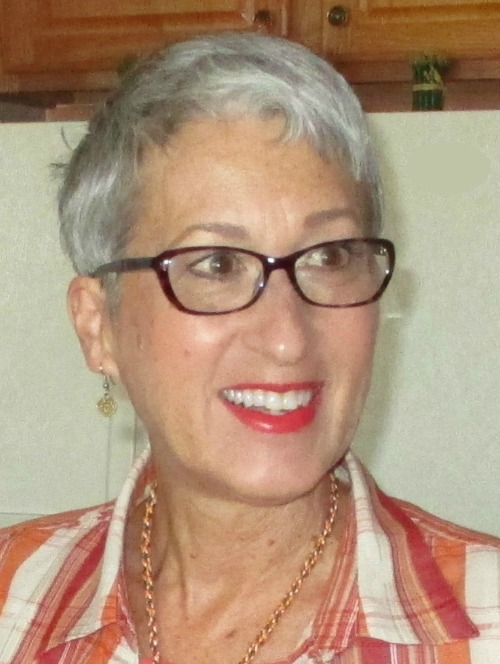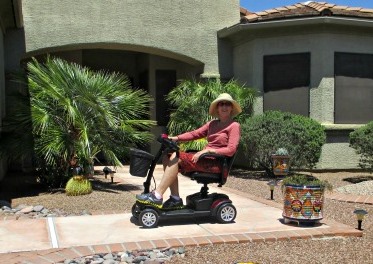Dagmar: “My ALS diagnosis pulled out the rug from under me, but I knew I had to get up and keep going.”
Published 11 Oct 2023 • By Somya Pokharna
Dagmar has always been in constant motion, thanks to her background in dance, gymnastics, and her extensive career in the wellness sector. However, her life took an unexpected turn in 2010 when she received a diagnosis that threatened to change everything she knew, but also revealed a reservoir of strength she never knew existed – Amyotrophic Lateral Sclerosis (ALS).
In this interview, Dagmar shares the profound physical and emotional impact the disease has had on her life. She discusses facing its challenges head-on, recounting the initial symptoms that left her stumbling and falling, as well as the gradual changes in her daily routine, all the while maintaining her independence and a positive outlook.
Read on to discover how her story serves as a testament to the power of resilience, positivity, and the unbeatable human spirit!

Hello, Dagmar! Thank you so much for agreeing to share your story with the Carenity audience.
First of all, could you tell us more about yourself?
I grew up in the Midwest - - Cedar Rapids, Iowa, and my favorite childhood sports were gymnastics and trampoline. Graduating from college with a master’s degree in dance, MOVING became my career. I spent the next thirty years working as a Wellness Director for a hospital that offered health and fitness classes for the community as well as its employees.
When my husband and I finally decided to retire from it all and move to Arizona in 2008, I fully expected to finally enjoy all the physical benefits gained from my years devoted to following a healthy and active lifestyle and, to continue to MOVE. Plus, finally have time to pursue fun, creative projects in fiber arts.

Could you describe your condition, ALS? When and how did you first notice the symptoms, and what prompted you to seek a diagnosis?
In 2010, two years after we moved to Arizona, I was diagnosed with Amyotrophic Lateral Sclerosis (ALS); a progressive neurological disease that destroys nerve cells and causes disability. ALS can appear in both men and women, young and old, the fit person as well as the couch potato. It has no known cause, no cure, and a prognosis of only 2-5 years. There is a form of ALS called familial or inherited, that accounts for 5 to 10 percent of cases in the U.S. The other 90-95 percent of cases are sporadic, having no family history at all. Mine is sporadic.
My initial symptoms were a sudden feeling of overall muscle stiffness in my whole body along with a strange weakness in my feet causing me to stumble and fall. Soon, I had to rely on a rollator to help me balance and walk; even simple movements became a challenge to do.
How has ALS affected your daily life and routine? What kind of physical and emotional challenges has living with this condition presented for you?
Gradually, my ALS symptoms caused me to give up cooking, then doing laundry, and finally driving and running errands by myself. My husband willingly took on all those duties — something for which I am forever grateful.
When I was diagnosed with ALS, I felt like the rug had been pulled out from under me. But instinctively, I knew I had to get up and keep going. What helped me rebalance my shattered emotions was to follow the very same wellness and movement principles I taught to others years earlier. By the end of four years, I found I had pieced together a formula that helped me live a balanced life while living with ALS.
During those first four years, I couldn’t find any other blogs or websites offering motivation and wellness information specific to ALS. So, I decided to fill the gap and begin sharing my thoughts and experiences with others through my own blog; the ALS and Wellness Blog.
What is your current treatment to control ALS symptoms? Are you satisfied with it?
I take the ALS medication Riluzole, which seems to have helped slow the progression of my symptoms. In addition, I try to eat healthy foods, do daily gentle exercise, get quality sleep, and focus my attention on various projects.
Can you share some of the strategies or assistive technologies you've used to maintain your independence and communication abilities?
I try to keep a positive attitude and find ways to stay involved in social activities to avoid the feelings of isolation and depression that so many ALS patients experience.
I use a rollator to help me walk around the house and ride a nifty little power scooter when I’m out and about. Several years ago, I began experiencing difficulty speaking and had trouble swallowing liquids. I didn’t panic and give up. Instead, I chose to adapt and cope in a positive manner. I’m able to continue safely drinking beverages without fear of choking by adding a thickening powder to my drink. In my quest to not lose the use of my voice, I’ve learned vocal techniques used by actors and singers such as diaphragmatic breathing and varying my pronunciation.
Fortunately, I still have the use of my hands.
Has your perspective on life and your priorities changed since being diagnosed, and how do you stay positive and maintain your emotional well-being while living with ALS?
Living with ALS has caused me to enter a new chapter in my life. I don’t dwell on the past; just savor the great memories and know that the most important moment is right “now.” I work hard to mentally embrace the changes happening to me. Rather than being overwhelmed with what I can no longer do, I consider what I can accomplish. For example, the groups and clubs I belonged to still needed help; my new limitations just meant I’d be helping in different ways. Writing online newsletters, helping track memberships, and even learning to build a website were all projects that helped me find a purpose.
How has the support of friends and family been crucial in your journey with ALS, and do you have any advice for others on how to best support loved ones dealing with similar challenges?
Each patient experiences a different ALS journey; symptoms and rate of progression can vary. My advice for friends and family is, don’t be afraid to help and don’t assume. Ask the patient directly what he or she needs. And don’t forget the caregiver. Find ways to help and support the caregiver and you will be helping the patient.
What are your hopes and aspirations for the future, both in terms of your personal life and the ALS community as a whole?
Of course, my big hope is that a cure for ALS will be discovered - - soon! And I hope I continue to live a long, healthy life all while living with ALS.
There’s a huge focus on the physical symptoms of ALS - - resulting in new technologies that help patients cope with those symptoms. But because every diagnosis includes the statement, “life expectancy of two to five years,” causing many patients to needlessly lose hope, withdraw, and give up - I would like to see more emphasis on supporting the area of psychological well-being; for patients, their caregivers and family members.
Do you have any final words of advice you'd like to share with others with ALS who are facing similar challenges?
Live one day at a time. Adapt, cope, and learn to accept change. Accept help from others. Learn to laugh and find humor in everyday situations. And finally, I invite everyone to read my blog where I share motivation and tips on how to live well with ALS.

A big thank you to Dagmar for this interview!
Do not forget to check out her blog: ALS and Wellness.
Did you find this story helpful?
Click Like and share your thoughts and questions with the community in the comments below!
Take care of yourself!

 Facebook
Facebook Twitter
Twitter


